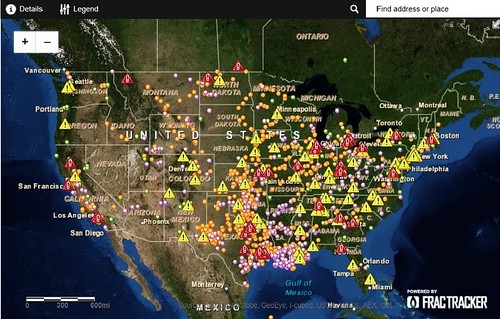Do you live near a railroad line? How about a pipeline? You might want to check into your proximity to those things.
Because America is the new Saudi Arabia, soon to be the world’s number one oil producer, the infrastructure that used to carry our energy products around is straining to meet the demand created by the new production.
This pressure is translating into pipeline accidents which are shockingly destructive. There are on average 1.6 pipeline accidents a day in the US, and the rate of pipeline accidents in Canada has doubled in the past decade. There are also rail disasters, like the recent Lac Megantic rail tanker explosion which killed 47 people and devastated a small town and the recent explosion in rural Alabama when a train carrying 2.7 million gallons of North Dakota crude oil derailed and exploded, sending up 300 foot flames.

Map of US Pipeline Accidents January 1, 2010 to March 29, 2013
Even pipeline regulators say they wouldn’t live near a pipeline:
A federal pipeline safety official admitted on camera recently that he made a point of ensuring his home wasn’t in the path of any pipelines before buying it, and that he wouldn’t advise anyone to build in the path of a pipeline. …
“Here is what I did when I bought my house – I looked on all the maps, I looked for all the well holes. I found there is nothing around me but dry holes and no pipelines. And it’s not because I’m afraid of pipelines, it’s not because I think something will happen. It’s because something could happen. … You’re always better off, if you have a choice….”
Energy giants need to get gas and chemicals to process their raw product to transport it to a refinery. Since US demand for petroleum products has been in decline since 2005 they also want to transport the refined product to a port in order to reach a higher paying market, which is why energy giants like Exxon are presssuring Congress to lift the US export ban on oil and other energy products like natural gas. Naturally, the President Obama has installed a friend of the energy giants as Secretary of the Department of Energy who is in favor of enormous profits for greedy polluters exports of energy products.
Taken together with natural gas, the US is awash in domestic fossil fuels that are largely stranded in North America, and is now in a position to reconsider its scarcity-based energy policies.
Should the export ban be lifted, there will be even more pressure on the energy transportation infrastructure and, hence, more danger for Americans living near pipelines, rail lines and roads where there will be increased truck traffic.

Recent Comments